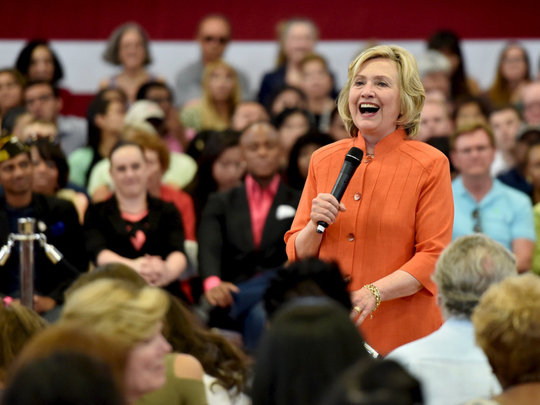
There’s no question which is the more interesting and dynamic primary campaign right now, which inevitably leads reporters covering the other one to search for something new to write about. And in a race where there’s an obvious (if not quite certain) nominee, there will always come a point at which the press will decide that that candidate is spiralling downward, the cloak of inevitability is torn and tattered, the campaign is in crisis, the whispering from party loyalists is growing louder, and the scramble is on to find an alternative before the fall occurs.
This is the moment we have come to with Hillary Clinton. First there was the fevered speculation about United States Vice-President Joe Biden running against her, based on second-hand reports that Biden has had conversations about the possibility of running. I’m sure that Biden thinks about being president about as often as he brushes his teeth, but that doesn’t mean there’s an actual candidacy in the offing. But it isn’t just him. ABC News reports that “a one-time high-ranking political adviser to Al Gore tells ABC News that a group of friends and former aides are having a ‘soft conversation’ about the possibility that Gore run for president in 2016”. Gore himself is not interested, but who cares? People keep asking US Secretary of State John Kerry if he’s going to jump into the race, no matter how many times he says no. Time magazine says Democrats are headed for a repeat of the 1968 election, with Clinton cast as Lyndon Johnson and her email controversy offered as a parallel to the Vietnam War (pretty much the same magnitude, right?).
Guess what: you put two or three former staffers to just about any major politician in a room, and they’ll have a “soft conversation” about how he really ought to run for president. If there’s one thing that stories like these should never be based on, it’s the mere fact that people who used to work for a particular politician would like that politician to run. Longtime political figures like Gore and Biden trail behind them a tribe of former staffers, advisers, fundraisers and the like, all of whom have entertained fantasies about either a job in the West Wing or at least a heady proximity to the most powerful person on earth. If you called up any of them, you could extract a quote that would make it sound like maybe, just maybe their guy might get in the race.
So right now there’s virtually no evidence that the Democratic field is going to expand beyond the current five candidates. And what about the idea that Clinton is in a drastic decline? Bernie Sanders has generated plenty of interest and some support, but that doesn’t necessarily mean Democrats are rejecting Clinton; if there’s any evidence that Sanders supporters won’t be perfectly happy to back her if and when she’s the nominee, I haven’t seen it.
If you look over the long term at Clinton’s favourability ratings, you do see a drop, but it’s not a huge one, and not the kind of precipitous decline you’d associate with a campaign in free fall. Her favourability is down substantially from when she was US Secretary of State, but that’s a natural consequence of her becoming a partisan political figure again. A year ago her favourability was just under 50 per cent, and now it’s around 41 or 42 — not what she’d like, surely, but hardly a crisis. As a point of comparison, at this time four years ago, US President Barack Obama’s job approval was in exactly the same place, 42 per cent. You may recall who won the 2012 election.
As Nate Silver observes, whether or not the movement in the polls is terribly meaningful, reporters have an incentive to describe it as such, and then run with the implications:
“Even if there were no Clinton scandals, however, she’d probably still be receiving fairly negative press coverage. The campaign press more or less openly confesses to a certain type of bias: rooting for the story. Inevitability makes for a really boring story, especially when it involves a figure like Clinton who has been in public life for so long.”
Perhaps Republicans will get their wish, and we’ll learn that Clinton sent an email ordering the attack on Benghazi to cover up the fact that she’s the leader of an Al Qaida sleeper cell whose goal is to enslave all Americans into a satanic Alinskyite death cult. If that happens, I’m sure some other Democrats will declare their candidacies. The other possibility is that the race will have some ups and downs, Sanders may even win a primary or two, and in the end Clinton will prevail. That’s not as dramatic a story as a reporter covering the campaign might like. But at this point it’s still the most likely outcome.
—Washington Post









